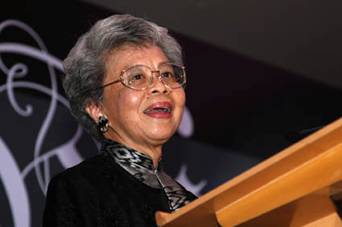|
NEWS |
C C Tan Award Acceptance Speech

The first speech I had to make was 31 years ago – at the formal Opening of the Legal Year in 1979. Then, I held a piece of paper quivering in my hand which the Chief Justice Mr Wee Chong Jin noticed and beckoned the Court attendant to switch off the ceiling fan.
Tonight I stand before you with no quivering of my hand – only of my voice!
Mr President, Council Members.
This is indeed a proud moment for me to be given the honour of the C C Tan Award and I thank you very much for it.
Undeserving as I am of the Award, I accept it in all humility and am happily reminded that it was in fact Mr C C Tan who introduced me to conducting tutorials in Conveyancing at the University in 1972.
Also to be acknowledged with affection and gratitude is my late father’s late partner Mr R L Eber who gave me a foothold to the governing body from which, it would appear, I took off.
When told by the President that I had to make an acceptance speech, I was speechless!
Recovering, I asked him what else was there to say. He said something about giving some advice to the young lawyers.
I thought about it and – you know – the young lawyers of today are spoilt – for choice and they have many distractions to contend with as well.
So, it comes down to making the right choice and not to be distracted by the many temptations coming their way. The thing is to stay focused and to do your work to the best of your ability to bring respect and distinction to the honourable profession you have chosen.
Before I leave the 31 years of history, Mr President – you have in your Message in the August issue of the Law Gazette credited me with recommending the purchase by the Law Society of its own premises. Unfortunately this is not strictly correct and I take the opportunity to set the record straight.
I made reference to this in my speech at the Annual Dinner (no dance, no theme, no dress code) – 31 years ago.
I quote: As you know, there has been a feeling for some time that a common meeting place would give us a sense of belonging. After the untiring efforts of several of my predecessors, I am happy to report that your Council has agreed, subject to your approval, to purchase our premises within walking distance of the High Court.
Progressing to the present day: As to be expected, a whole lot of changes have taken place since I started practice eons ago.
Since the passing of the Land Titles Act 16 years ago (1993), most of the land in Singapore has been converted to registered land, thus depriving the conveyancer of his main responsibility of ensuring that his client, the purchaser, obtains a good title to the property – the conveyancer’s job of investigating title becomes redundant.
To transfer or otherwise dispose of immovable property now consists of filling in prescribed forms. This has struck a death knell to what was described by Burnett as the esoteric art of conveyancing.
Added to this brainless exercise of form filling, the other important part of a sale and purchase transaction is the formation of the contract or agreement for sale and purchase. In this, the solicitor’s role has been usurped by estate agents who, by the option to purchase he obtains for the purchaser on payment to the vendor one per cent of the purchase price as the Option fee, concludes the deal – before you can say Lewis Hamilton – sans collision or other accident.
With the abolition of scale fees, the conveyancing scene has been reduced to a pasar malam. As in a pasar malam, clients comb the market comparing prices and searching for a bargain. When he applies to the bank for a loan, he is told the bank will pay part of his legal fees – which is all to the good – this legal subsidy is something like 0.4 per cent of the loan amount or $2,500 whichever is less. The bank officer will advise him, very nicely, that he will save a substantial sum in legal fees if he instructs the bank’s lawyer to act for him as well AND (here comes the sting) – the legal subsidy will not be given to him if he uses his own lawyer.
I have left the best to the last – the strategy, not being without an ulterior motive!
May I charge you Mr President and your Council to take up this matter with the Association of Banks, with a view to “advising” – nay – directing their members (not all Banks are guilty of this) – to cease this unhealthy, unfair and unethical practice.
I thank you Mr President (in anticipation).